Though rewarding in more ways than one, choosing a career in medicine is a huge commitment. This is precisely why prospective medical students and their parents might like to consider enrolling in a medicine summer camp before applying for college.
Medical summer programs are available across the US, and many have some seriously big names behind them. From Harvard and Stanford Universities to the Centers for Disease Control and Prevention to more local options that are just as excellent in quality, you can find programs in major cities across the United States.
These pre-college camps are a great way for your children to learn if a career in medicine or science is right for them.
Best Medicine Summer Camps
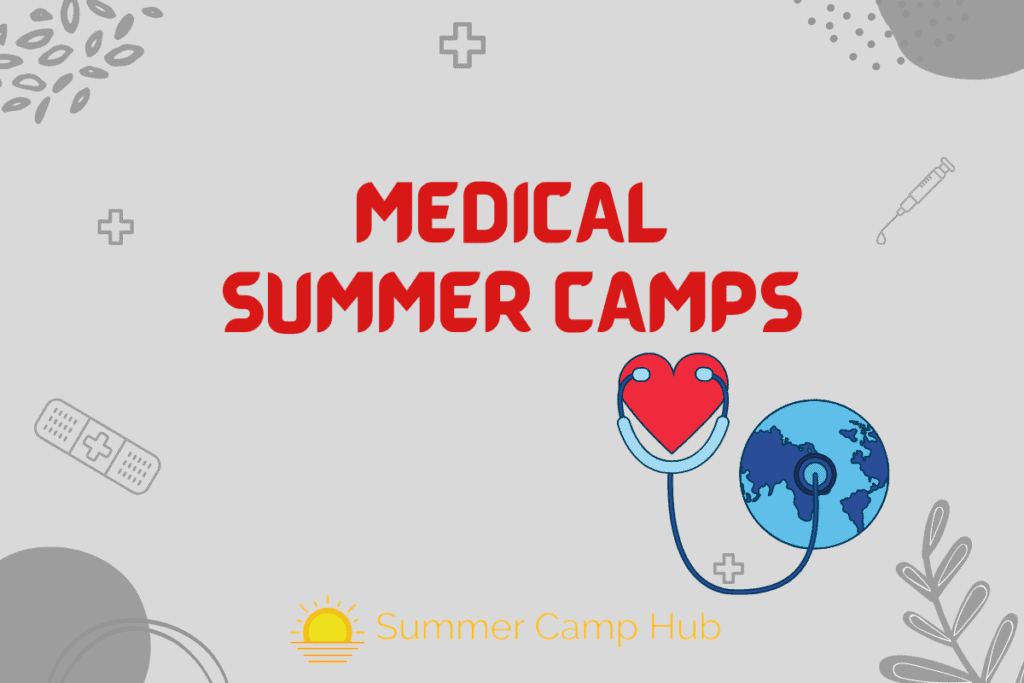
National Student Leadership Conference
National Student Leadership Conference (NSLC) camps are aimed at students who want to explore the idea of a medical career. By assuming the role of a doctor, students can decide whether this is the right path for them before embarking on a full-time medical degree.
The physician’s role taken on by each student involves diagnosis, surgical skills, and discussion of public health matters. The program is designed as a fully immersive experience so students can acquire real-life skills and expertise under the guidance of medical professionals.
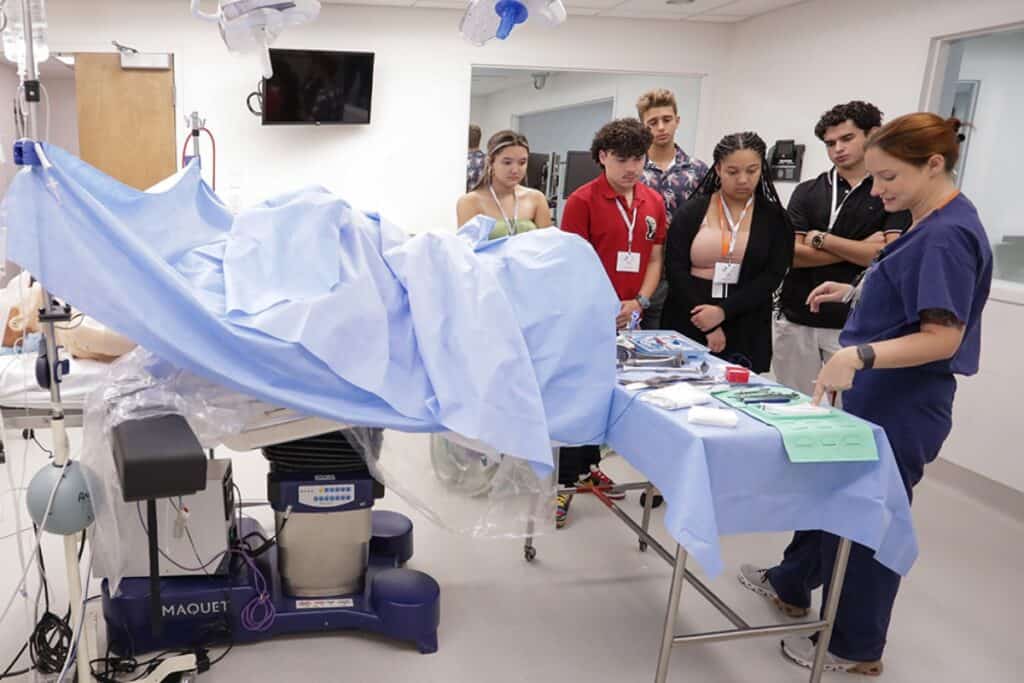
This program stands out because of the level of insight each attendee gains. This is achieved via various means, including field trips and facility tours, a leadership skills curriculum, and practicing actual surgical skills such as knot tying and suturing. Via local trips, students also get to discover the city around them.
Camps are delivered in Washington D.C., Chicago, San Francisco, Miami, Durham, and New Haven. Fees range between $3895 and $4095, and all courses are offered solely on a residential basis during the summer.
Centers for Disease Control and Prevention
The Centers for Disease Control and Prevention operates an intensive and interdisciplinary program in Atlanta, Georgia. High school students aged 16 or over who are due to complete their final two years of high school may apply. Participants will become immersed in a range of topics related to public health.
Among the key aims of the CDC Museum Disease Detective Camp is to educate the public regarding the role of the Centers for Disease Control and Prevention, which reflects the ethos of the museum itself.
This demanding program moves along at a fast pace and has a strong academic focus. The topics covered vary from one summer to the next but will include a selection of public health subjects from global to environmental health and outbreaks and much more.
The program is completely free and students just need to figure out their own transport, plus accommodations if required. Non-Atlanta residents are also welcome to apply. Program hours are between 8:45 am and 4:00 pm each day.
Drexel University College of Medicine
This summer camp offered by the Drexel University College of Medicine is specially designed for high school students with an interest in neuroscience. It’s open to both sophomores and juniors. It has a particular focus on neurophysiology, molecular neurobiology, and neuroanatomy.
There’s no better place to learn all about neuroscience and medicine than with this award-winning faculty. Led by the directors, graduate students are involved in instruction, and attendees even receive a certificate upon completion.
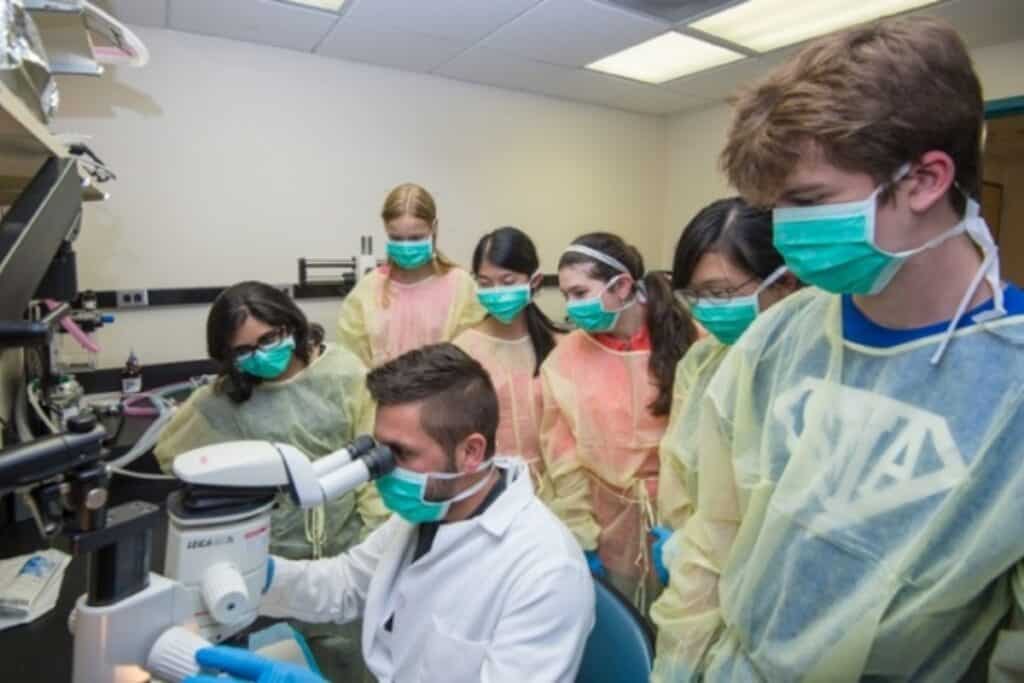
This Drexel University College of Medicine summer program includes live brain activity recordings and a hands-on lab-based project incorporating neuroscience techniques. Project presentation and literature searching are also covered.
The lecture program includes topics ranging from brain anatomy and brain-machine interfacing to cellular neuroscience, electrophysiology, and sensory processing.
Camp takes place in July, and as competition for places is very high, early application is advised. The tuition cost is $2200, and delivery takes place at Philadelphia’s Queen Lane Campus. Note that this is not a residential camp but is delivered daily between 10 am and 4 pm with lunch supplied.
Johns Hopkins School of Medicine
Underrepresented students in particular are targeted by the Johns Hopkins Career, Academic, and Research Experiences for Students (CARES) Summer Symposium. Programs focus on everything from medicine to public health and science.
A range of JHUSOM Pathway Programs are available across the campus in Baltimore. These are paid research programs based in clinics, offices, and laboratories, which are free to attend and actually provide stipends. Students with an interest in science and medicine are recruited locally in order to be educated and developed by the program.
The summer research programs offer a range of specialisms. Some are open to particular candidates, such as those from low-income or bi-cultural backgrounds or academic high achievers.
Example topics covered by current programs include computational medicine, pulmonary and critical care, nanobiotechnology research, neuroscience, and more. They are long programs lasting 8 to 10 weeks, with some extending years over their high school journey.
National Institutes of Health
The High School Summer Internship Program invites students to participate in the Intramural Research Program at the National Institutes of Health (NIH). This summer opportunity is open to 11th or 12th graders with a keen interest in healthcare and research.
Successful applicants will work in the NIH Intramural Research Program. The positions are full-time and involve research groups in various locations with the main NIH campus situated in Bethesda, Maryland.
A Principal Investigator oversees each research group, and students will be placed in one of these to work as a researcher. Projects are centered on behavioral, biomedical, and social sciences, so they can suit attendees with a range of interests, including computer science, biology, engineering, chemistry, mathematics, and more.
Every intern will benefit from access to career and education advice, well-being instruction, and professional development programs. Underrepresented groups are particularly encouraged to apply, and all students must be aged 17 or older. Funding is provided by NIH to support each intern.
Baylor College of Medicine
The Smart Program is offered by the Graduate School of Biomedical Sciences at Baylor College of Medicine. It supplies undergraduate biomedical summer research projects covering various subjects.
Unlike other medical summer camps, this is a paid opportunity. Attendees are compensated for 9 weeks’ work to the tune of $5,400. This may be paid as a salary or be partially used to fund accommodation and travel expenses. Housing is available near the facility in Houston, Texas, which forms part of the huge Texas Medical Center.
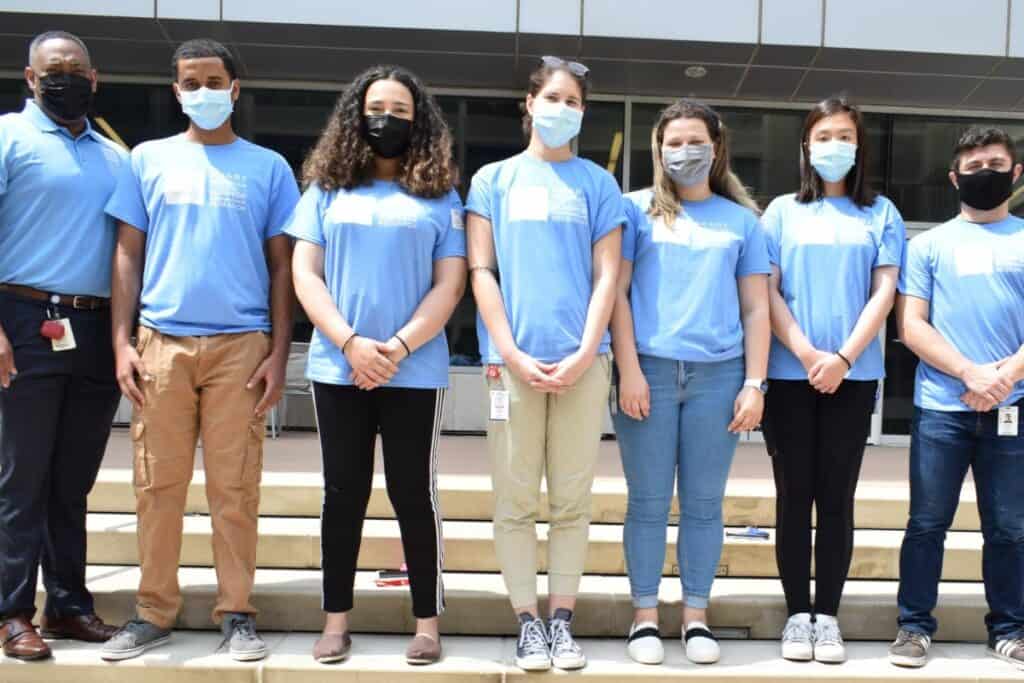
This nationally recognized program welcomes applicants from any science or math majors, plus non-science majors with a strong interest and background in biomedical science. Projects are wide-ranging, and may focus on the likes of computational biology or bioengineering.
By the end of this paid program, students will receive a good grounding in biomedicine via seminars and discussion groups, research projects, and additional activities. Meeting other participants, plus Baylor College of Medicine students and staff also forms a key part of the experience.
Stanford Medicine
The Stanford Medical Youth Science Program (SMYSP) is a fully immersive, five-week summer camp only open to Northern California high school juniors. But those who are not from this area can also check out their other programs from the School of Medicine. Applicants must also be from a low-income background and should be prospective first-generation college students.
Kids who qualify and successfully apply for this camp will attend the Stanford campus between late June and late July, and applications must be made by mid-March. The program focuses on science and medicine and is aimed at producing the next generation of health leaders.
This enriching, immersive program is delivered to only 24 students per summer. It’s tuition-free, and students are fully mentored throughout.
For many first-generation college students, SMYSP becomes a home base they’ll stay connected to for the rest of their lives. Beyond the course itself, program attendees benefit from lifelong friendships, networking, career opportunities, and access to relevant higher education.
Students will need to attend Stanford campus daily throughout. It encompasses hospital internships, lectures and seminars, a public health research project, and specialized educational segments. Dedicated counselors and instructors ensure a supportive, fun, and enriching experience for every student.
Wake Forest University
For high school students with an interest in medicine, attending the Wake Forest Summer Immersion Medicine Institute is the ideal introduction to life as a physician. In addition to wearing a white coat while exploring the field, students will truly understand all that a medical career has to offer and the opportunities in a variety of disciplines.
Programs are based at the Wake Forest University Campus in Winston-Salem and run for a week. They’re open to students in 9th to 12th grade and operate between Sunday and Friday. Tuition fees for the week add up to $3000.
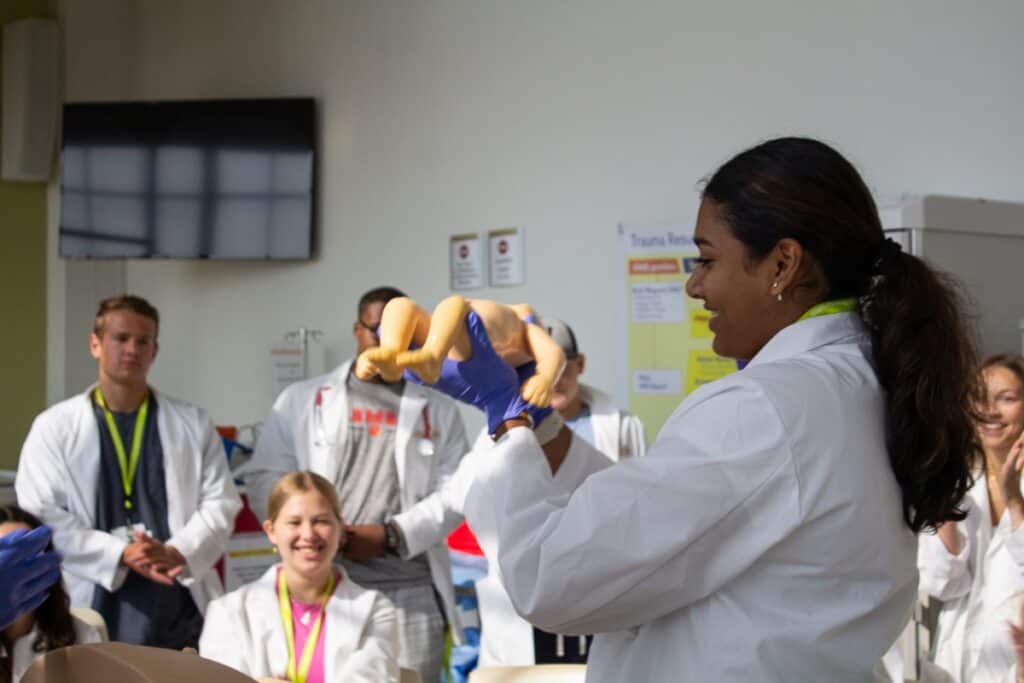
A broad range of medical topics are covered including cardiology, neurology, pulmonology, surgery, internal medicine, and ultrasound. The course is residential, commencing with breakfast and an 8 am meeting until dinner, evening activities, and free time.
Immersive experiences include touring the Wake Forest School of Medicine, visiting the Atrium Health Wake Forest Baptist Medical Center, and meeting current medical students. Students can also interview patients, try out suturing, take blood pressure, and perform ultrasounds to get real hands-on experience.
The Academies by Harvard Student Agencies
By the end of their program at The Academies, operated by Harvard Student Agencies, attendees will gain a good understanding of what life as a medical student might really have in store for them.
All medical fields are covered by the programs, which involve interacting with Harvard medical students as well as being taught key clinical skills by professionals. Participants can apply for one of two options, focusing on either anatomy and physiology or biology and chemistry.
The biology and chemistry focus centers on a specific genetic disorder or disease, culminating in a presentation that reflects a deep study of the topic. For human anatomy and physiology students, practical aspects include case studies, blood work, and medical imagery.
These respected Harvard programs are open to grades 9 through 12, run for a week and cost $1450. Need-based scholarships are available to both US-based and overseas students.

Leave a comment